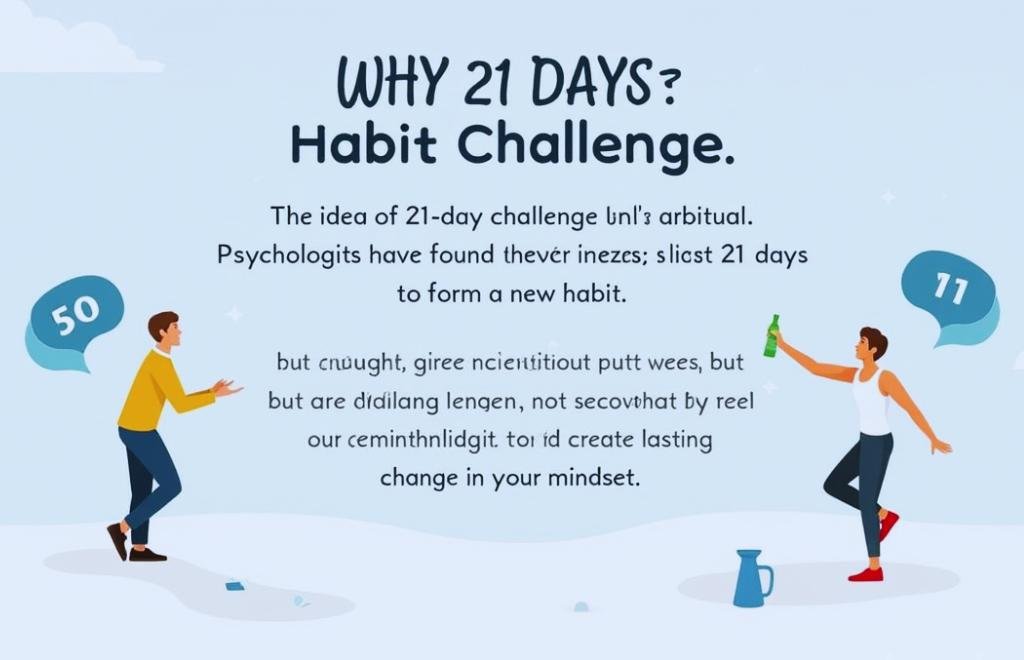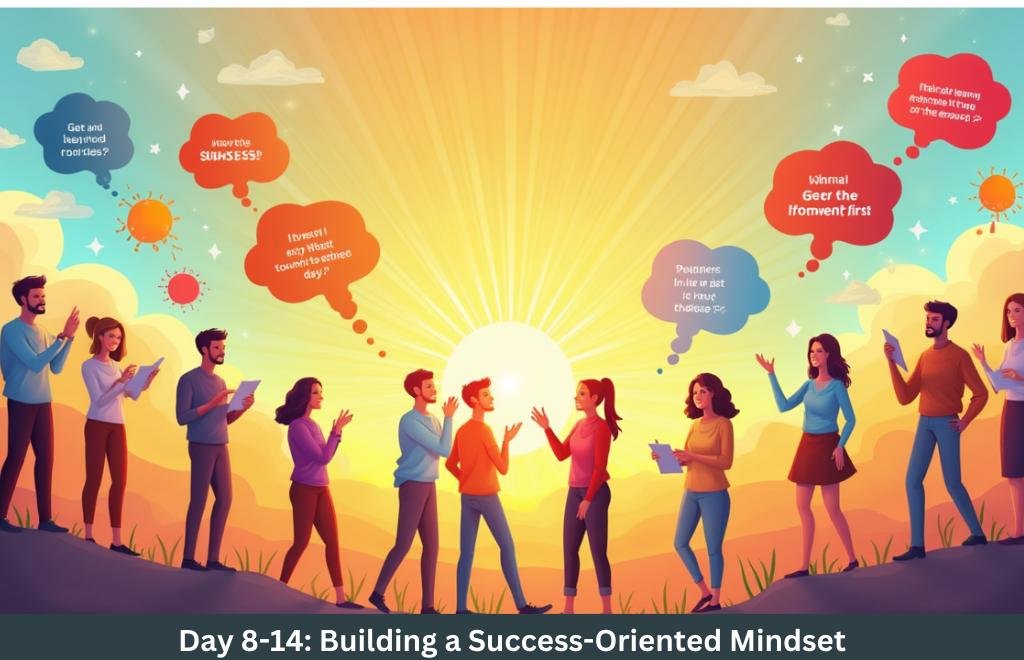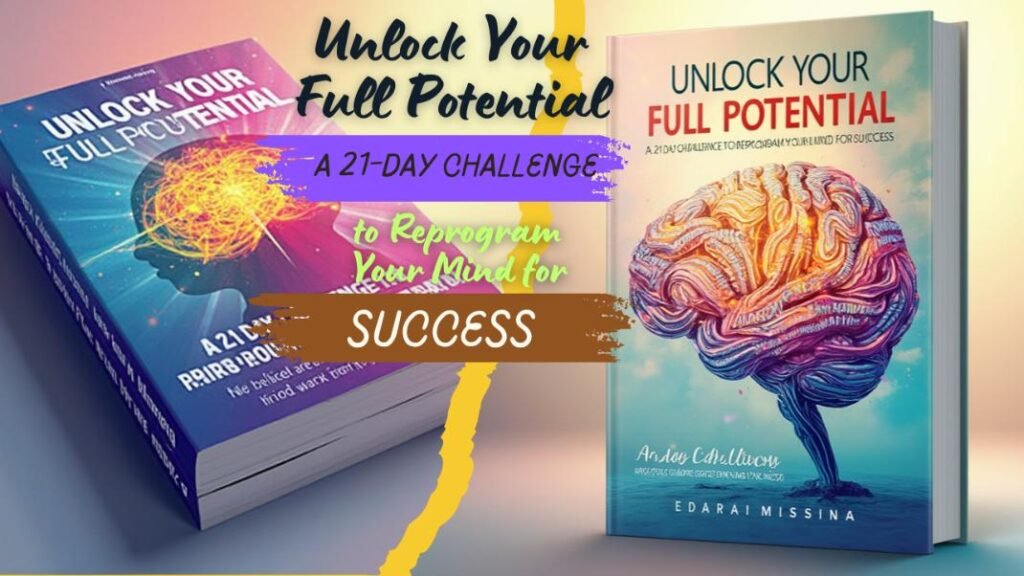Introduction
Have you ever felt stuck, unable to reach your full potential? Maybe you’ve got dreams, but they always seem just out of reach. What if I told you the key to unlocking those dreams lies within your own mind? This is where the 21-Day Mindset Reprogramming Challenge comes in.
This challenge is about changing the way you think, flipping the script on those self-limiting beliefs, and setting yourself up for success. It’s not a magic fix, but over the course of 21 days, you’ll develop the habits and mindset shifts needed to finally start achieving your goals.
What Does It Mean to Reprogram Your Mind?

Before we dive in, let’s talk about what it means to reprogram your mind. Our brains are like computers—over time, we develop habits, beliefs, and thought patterns that shape how we see the world. Unfortunately, many of us are running on outdated “software.” Reprogramming your mind means updating this mental software, replacing negative or limiting thoughts with positive, success-driven ones.
The Role of the Subconscious Mind in Success

Most of our behaviors and reactions are governed by the subconscious mind, which is often where limiting beliefs reside. Think of it as a storage space for all your past experiences, beliefs, and learned behaviors. When we fail to address negative thoughts embedded in the subconscious, they act as invisible roadblocks to success.
So, to truly achieve success, it’s critical to access and change these hidden patterns in your mind.
Why 21 Days? The Psychology of Habit Formation

The idea of a 21-day challenge isn’t arbitrary. Psychologists have found that it takes approximately 21 days to form a new habit. It’s enough time to introduce change but not so long that it feels overwhelming. By consistently practicing new habits for three weeks, you’ll create lasting change in your mindset.
Day 1-7: Awareness and Detoxing Negative Thoughts

Day 1: Identifying Limiting Beliefs
The first step in this challenge is awareness. Take a moment to identify any negative beliefs holding you back. This could be thoughts like, “I’m not good enough,” or “Success isn’t meant for me.” Once you’ve spotted these limiting beliefs, you can start working to change them.
Day 2: Practicing Mindfulness
Mindfulness is key in this process. It helps you stay present and aware of your thoughts. Simple daily practices like meditation or even mindful breathing exercises can help quiet your mind and bring focus.
Day 3: Setting Clear Success Goals
Setting goals gives your mind direction. Write down exactly what you want to achieve and make these goals as specific as possible. Vague goals lead to vague results, so get clear on what success looks like for you.
Day 4: Daily Affirmations for Success
Positive affirmations are powerful tools to reprogram your subconscious. By repeating positive statements, you’ll start to believe them. For example, saying “I am capable of achieving my goals” each day rewires your brain for success.
Day 5: Visualizing Your Success
Visualization is like a mental rehearsal for success. Research has shown that when you vividly imagine yourself achieving your goals, your brain starts to believe it’s already possible. Spend a few minutes every day picturing your success in as much detail as possible.
Day 6: Surrounding Yourself with Positivity
Your environment shapes your mindset. Surround yourself with positive people, inspiring books, and encouraging content. Let go of anything or anyone that feeds negativity.
Day 7: Emotional Detox
Emotions like fear, anger, and doubt often weigh us down. Journaling is an effective way to release these emotions and clear space for positive energy. Reflect on what emotions are holding you back and consciously let them go.
Day 8-14: Building a Success-Oriented Mindset

Day 8: Cultivating Gratitude
Gratitude shifts your focus from what’s lacking to what’s abundant in your life. Take time each day to write down three things you’re grateful for. This simple practice rewires your brain to notice more opportunities and positivity.
Day 9: Developing a Growth Mindset
A growth mindset is essential for success. This means seeing challenges as opportunities to grow rather than obstacles. Embrace failure as a learning tool and understand that your abilities can always improve with effort.
Day 10: Practicing Resilience
Resilience is your ability to bounce back from setbacks. Instead of getting discouraged when things don’t go as planned, view it as part of the journey. Resilience builds mental toughness, a key ingredient for success.
Day 11: Learning to Embrace Discomfort
Growth doesn’t happen in your comfort zone. This week, make a habit of doing one small thing that makes you uncomfortable, whether it’s speaking up in a meeting or trying something new. The more you embrace discomfort, the more you’ll grow.
Day 12: Time Management for Success
Success is often a result of how well you manage your time. Prioritize tasks that align with your goals and cut out activities that distract you. Tools like to-do lists and time-blocking can help keep you focused.
Day 13: Building Self-Discipline
Discipline is about doing what you need to do, even when you don’t feel like it. Set daily non-negotiables that push you towards your goals and stick to them, no matter what.
Day 14: Avoiding Procrastination
Procrastination is the enemy of progress. Break tasks into smaller, manageable chunks, and take immediate action. The key is to focus on starting rather than waiting for the “perfect” moment.
Day 15-21: Embedding Success Habits into Your Daily Life

Day 15: Making Personal Development a Habit
Success requires continuous learning. Make personal development part of your daily routine by reading books, listening to podcasts, or attending workshops that help you grow.
Day 16: The Power of Networking and Mentorship
Surround yourself with people who inspire and challenge you. Networking and finding mentors provide you with support, guidance, and invaluable feedback.
Day 17: Celebrating Small Wins
Don’t wait until the end of the journey to celebrate. Acknowledge and reward yourself for small victories along the way. This keeps you motivated and reinforces the positive habits you’re building.
Day 18: Adopting a Solution-Oriented Attitude
When challenges arise, focus on finding solutions rather than dwelling on problems. A solution-oriented mindset trains your brain to look for opportunities even in difficult situations.
Day 19: Building Confidence and Self-Belief
Confidence is built through action. By consistently working towards your goals, you’ll naturally start to build self-belief. Celebrate your progress and remind yourself of how far you’ve come.
Day 20: Fostering Patience and Perseverance
Success doesn’t happen overnight. Patience and perseverance are essential to staying committed even when results aren’t immediate. Trust the process and keep pushing forward.
Day 21: Creating Your New Mindset Rituals
By the end of this challenge, you’ll have a toolbox full of new habits and strategies. Now, make them a part of your daily routine. Whether it’s affirmations, visualization, or goal-setting, keep practicing these rituals to maintain your success mindset.
The Benefits of Completing the 21-Day Challenge
By the end of the 21-day challenge, you’ll notice significant shifts in your thinking and behavior. You’ll feel more confident, more resilient, and more in control of your destiny. These changes will benefit not only your personal life but also your career and relationships.
Conclusion
Reprogramming your mind for success is a powerful process, but it’s also deeply personal. Over the last 21 days, you’ve developed habits that will help you reach your goals, not just in the short term, but for the rest of your life. Keep the momentum going, and continue to nurture your new mindset.

